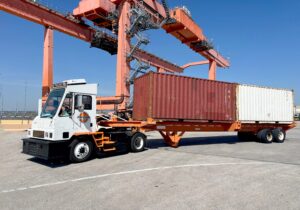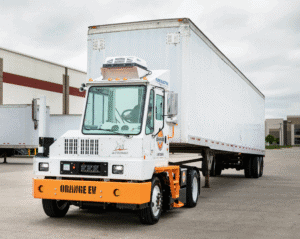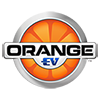As published on EVInfo.

In the landscape of electric vehicles (EVs), much of the attention gravitates toward consumer electric cars and SUVs. But another vital transformation is happening, in ports, warehouses, and distribution centers. That transformation is being driven by the all-American company Orange EV, which builds, sells, and services heavy-duty electric vehicles for some of the most successful companies in the world.
Many people assume that heavy-duty electric trucks face insurmountable barriers, whether it’s concerns about range, a lack of public charging, massive infrastructure costs, or the absence of a reliable service network. In reality, none of these challenges apply to Orange EV’s trucks. Their vehicles are designed for the specific duty cycles of yard operations, where range requirements are well within the trucks’ capabilities, charging is managed on-site, infrastructure is streamlined, and service is delivered directly by Orange EV’s dedicated mobile support teams.
Orange EV Manufactures Top Quality Fully Electric Class 8 Yard Trucks
Founded in 2012 and based in Kansas City, Kansas, Orange EV manufactures fully electric Class 8 yard trucks (sometimes called yard dogs or terminal tractors). Their mission: replace diesel trucks in demanding, high-utilization sites with zero-emission alternatives that perform reliably under tough conditions.
What sets Orange EV apart is the depth of their offering. Their core product, the e-TRIEVER®, is a purpose-built electric yard tractor engineered from the ground up for heavy workloads and frequent cycling. Another variant, HUSK-e®, adapts to the most demanding use cases like port and rail sites.
However, the company doesn’t stop at vehicles. They offer charging systems (including a battery-integrated fast charger they call the “Orange Juicer™”) and provide full turnkey solutions: the trucks, chargers, and on-site service all together. Firms adopting their technology don’t have to become EV experts themselves.
Reliability is central in industrial environments, and Orange EV emphasizes strong uptime performance in real deployments. Their warranty covers major components like batteries and motors over extended years. They deploy mobile technicians, stock common parts around the country, and resolve issues swiftly, minimizing disruption to operations. Site engineering is also part of the package: duty cycles, facility layouts, and power infrastructure are carefully considered to optimize performance.
Switching a Yard From Diesel to Electric Offers Many Advantages
Switching a yard from diesel to electric unlocks multiple advantages. Eliminating tailpipe emissions improves air quality in densely industrial zones, reducing worker exposure to particulates and NOx. Operationally, electric trucks cut fuel and maintenance costs, given their fewer moving parts and simpler drivetrains. Their torque delivery is smooth and predictable, which helps in the frequent start-stop motion of yard work, and they generate far less noise, easing worker comfort and regulatory burden.
By 2025, Orange EV had delivered over 1,600 trucks to more than 300 fleets across the U.S., Canada, and even into the Caribbean. These trucks have logged millions of hours in real operations, validating the business case of electrification in tough environments. On the charging front, their battery-integrated fast charger systems assist operators in overcoming one of the biggest hurdles: delivering reliable, high-power charging under industrial constraints.
EVinfo.net spoke with Zack Ruderman, VP of Sales & Marketing, Orange EV.
“Our trucks are behind the scenes so don’t get noticed, but are proven as a better solution than diesel in every way,” said Ruderman.
“We’re Class-8 so we often get lumped in with assumptions about the technology for heavy-duty trucks not being ready – or lack of public charging – or insufficient range – or huge infrastructure costs – or no service network – etc. But none of those barriers are true for our trucks,” continued Ruderman.
EVinfo.net reported last week on Orange’s impressive announcement that its deployed fleet has surpassed 10 million operating hours. The company’s trucks have logged nearly 27 million miles, eliminated approximately 200,000 tons of CO₂ emissions, and have already saved fleets an estimated $100 million in fuel and maintenance costs alone, compared to diesel yard trucks.
“Ten million hours makes one thing clear: Orange EV has taken electric terminal trucks from possible to proven,” said Kurt Neutgens, President and CTO of Orange EV. “Our 340 customers are operating at an average of 97% uptime, with no compromises, proving you can cut costs, boost performance, and improve health and safety all at once.”
Orange EV Is 100 Percent American Owned and Operated
One particularly compelling part of Orange EV’s story is that their trucks are designed, engineered, and built in Kansas City, Kansas. They emphasize that they are 100 percent American owned and operated, reinvesting their innovation, profits, and development back into the U.S.
Orange supports domestic supply chains and creates skilled jobs for American workers. This “Made in the USA” identity is more than marketing, it aligns with federal procurement guidelines (such as Build America / Buy America compliance), enabling fleets to tap into incentives while supporting a stronger domestic economy. In their promotional materials, they assert that a busy 2-shift operation could save as much as $500,000 per truck, over the first ten years of operation.
Of course, the path to electrifying heavy-duty yards isn’t without challenges. The upfront capital for trucks and chargers is higher than diesel, and site infrastructure must be carefully designed to handle power demand and grid constraints. Battery longevity under high-duty cycles must be managed, and operational workflow adjustments are required. Yet Orange EV’s integrated model, blending vehicle, charging, support, and warranties, serves to de-risk much of the transition.
What makes Orange EV stand out is that they are not just building a truck. They present themselves as solution providers: orchestrating vehicles, chargers, service networks, and site engineering. Their U.S.-based manufacturing, domestic supply chain focus, and compliance with federal procurement norms give them a strategic edge in deployments tied to public funding or industrial mandates.
 Orange EV is well positioned to scale further, especially within large ports, intermodal hubs, and logistics complexes. Advances in battery capacity, modular architectures, and faster charging will only strengthen their proposition. The possibility of integrating energy storage and vehicle-to-grid capabilities could turn their deployments into flexible grid assets. And though they currently focus on yard tractors, expansion into other heavy-duty electrification segments, or international markets, remains a natural extension.
Orange EV is well positioned to scale further, especially within large ports, intermodal hubs, and logistics complexes. Advances in battery capacity, modular architectures, and faster charging will only strengthen their proposition. The possibility of integrating energy storage and vehicle-to-grid capabilities could turn their deployments into flexible grid assets. And though they currently focus on yard tractors, expansion into other heavy-duty electrification segments, or international markets, remains a natural extension.
Orange EV may operate behind the scenes, but they are a foundational piece in the electrification of freight. By converting the workhorses of transportation into zero-emission machines, and manufacturing them on U.S. soil, they are helping chart a cleaner, more resilient future for industrial mobility.
Industry Veterans Dan Fedor and Tony (Marc Anthony) Nisam Join Orange
Well-respected EV industry veterans Dan Fedor and Tony (Marc Anthony) Nisam recently joined Orange. They are both highly esteemed colleagues of EVinfo.net, and are highly recommended. We’ve been impressed by their important EV adoption work for several years now, and are thrilled to report they have joined Orange, a well-respected leader in the heavy-duty EV industry.
EVinfo.net spoke with Orange’s Dan Fedor. Prior to joining Orange EV, Fedor spent many years in the EV industry with deep experience at Blink Charging, EV Box and more, but it was his time at GM’s Brightdrop that has proven the most valuable to his new role at Orange EV.
“I’ve been privileged to work in the electric vehicle and charging space since its rebirth, and I’ve seen a lot of impressive technology. But at Orange EV, it feels like the founders had a crystal ball when they chose what to build, where to build it, and what to put inside of it. Of course, it wasn’t luck or magic — it was the result of thoughtful, rigorous research into the best use case for electrification. The outcome is the industry’s best spotter truck, full stop — and it’s electric in every sense of the word,” said Fedor.
EVinfo.net spoke with Tony Nisam, Regional Sales Manager for the Pacific Northwest with Orange EV. Before joining Orange EV, Nisam spent many years in the EV industry, including L-Charge and Motiv Power Systems.
“I’m charged-up to begin a new chapter as Regional Sales Manager for the Pacific Northwest with Orange EV. Orange EV is leading the way in delivering the best heavy-duty terminal trucks in the industry, and I’m eager to contribute to that mission. Helping fleets across the PNW transition to the cleanest, most efficient, and most reliable Class 8 terminal trucks in the world is both a tremendous opportunity and something I’m truly passionate about.”
Published: October 2025/EVInfo
